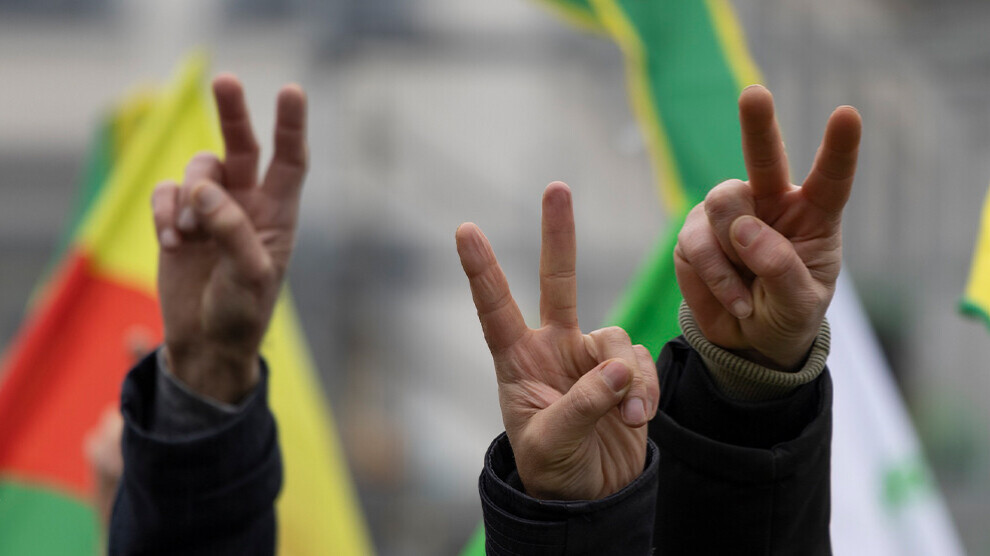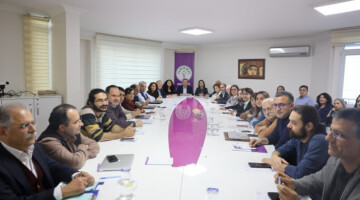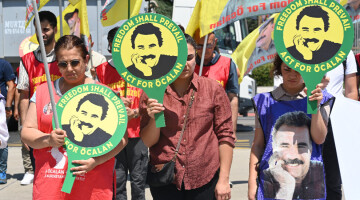A few days before the elections in Germany on February 23, the Central Human Rights Council of the Kurds in Germany (ZMRK) formulated its expectations and demands of the future federal government. In view of the current challenges and the relevance of a just and human rights-oriented policy in Germany, the following demands were made:
1. Equality
The institutional recognition of Kurdish identity is essential. This includes the use of the Kurdish language in official publications, the introduction of mother-tongue teaching in Kurdish throughout the country, and statistical recording as Kurds.
2. Anti-discrimination
We demand concrete and preventive measures against the Gray Wolves, one of the largest right-wing extremist groups in Germany, which specifically endangers Kurds, Armenians, Greeks and other groups of people who do not fit into their world view.
3. Peace-oriented foreign policy
In the interest of maintaining close German-Turkish relations, Kurds in Germany are subjected to immense human rights violations. It is therefore crucial that the German government contributes to a democratic and peaceful solution of the Kurdish question. Measures that strengthen the Kurds’ right to cultural and political self-determination and autonomy must be supported. As a close NATO partner of Turkey, Germany has the historical role of mediator to support a sustainable solution to the Kurdish question and thus promote a just peace, democracy and stability in the Kurdish regions and in Turkey. The German government must no longer tolerate Turkey's attacks, occupations, annexations and displacements in the Kurdish areas of southeast Turkey, northern Iraq and Syria, which are in violation of international law.
4. Migration and Asylum
Deportations of Kurdish refugees to Turkey, Iraq and Syria, as well as to Iran, must be stopped as a matter of urgency in view of the risk of unfair proceedings and political persecution. Kurdish activists and other individuals at risk require special protection from extradition to states where they may be persecuted.
5. Persecution of opponents in Turkey
The German government must take decisive action against the persecution of people in Turkey who have exercised their constitutionally guaranteed fundamental rights of freedom of expression, association and assembly. Concrete measures to protect these fundamental rights and to ensure the safety of German citizens in Turkey are necessary.
6. Cooperation with Kurdish organizations
The concerns and perspectives of Kurdish organizations in Germany must be included in the political decision-making process. Close cooperation with these organizations is necessary to effectively represent and support their concerns.
7. Protection of the human rights of Abdullah Öcalan
Abdullah Öcalan has been held under inhumane solitary confinement conditions on the Turkish prison island of İmralı for over 25 years. Abdullah Öcalan's solitary confinement violates international law, in particular the European Convention on Human Rights. Abdullah Öcalan has a key role to play in a solution process. His willingness to work for a peace process in Kurdistan, Turkey and the Middle East must be recognized. The German government should therefore work to end his isolation and immediately implement the relevant decisions of the Council of Europe's Committee of Ministers from September 2024.
8. Promote democratic participation – end criminalization!
The PKK ban places tens of thousands of Kurds in Germany under general suspicion and inhibits not only their democratic participation, but also fair asylum procedures and the development of their cultural identity. Furthermore, it provides the basis for legitimizing comprehensive criminalization and war crimes and human rights violations in Kurdistan. The PKK is a party to an armed conflict. The Court of Cassation in Brussels also came to this conclusion in 2020. In this conflict, the PKK has demonstrated its willingness to pursue a peaceful solution more than once. The PKK ban in Germany, on the other hand, is an open obstacle to a possible peaceful transformation of the conflict. Therefore, the PKK's application for the ban to be lifted must be granted.
9. Stop arms deliveries to Turkey
Germany is one of the largest arms exporters to Turkey. It is well known that Turkey regularly uses these weapons in wars of aggression in the Kurdish regions in violation of international law. In addition, Islamist militias are also being equipped with these weapons. It is imperative that arms exports to Turkey be stopped immediately. Protecting human life and complying with international law are of the utmost priority.
10. Protection against espionage and danger
More than 8,000 MIT agents live in Germany. These are agents of the Turkish secret service MIT, whose job it is to spy on political opponents and take retaliatory measures against them. In Turkey, MIT is known for numerous political murders and ties to the mafia and the terrorist militia ISIS. The German government must take consistent and preventive action against these networks as a matter of urgency and protect human lives.
11. Limit the threat posed by the rise of Islamism
Kurdish people are disproportionately affected by Islamist terror and violence. The German government must work to ensure that all people are protected from Islamist terror. This must be achieved by taking preventive action against those structures and individuals who belong to the Islamist scene. Furthermore, an immediate end to uncritical cooperation with Turkey is required. Turkey has contributed significantly to the strengthening of global Islamist terrorist organizations.
12. Repatriation of German ISIS fighters and other foreign fighters who left Germany
The repatriation of German ISIS fighters and their relatives, as well as a conviction in Germany, are necessary to relieve the burden on the security forces in northern and eastern Syria and to ensure that perpetrators are convicted under German law for their war crimes.
13. Recognition and documentation of anti-Kurdish racism
The recognition and scientific and statistical documentation of cases of anti-Kurdish racism is urgently needed. Preventive measures must be taken against everyday anti-Kurdish racism, both at the structural level and in the form of everyday racism that Kurds are exposed to.
14. Protection of human rights
We expect the next German government to be unreservedly committed to protecting and promoting human rights. This includes combating all forms of discrimination, racism and hostility towards others, as well as protecting the rights of minorities and refugees.
Furthermore, it should be noted that so far only the party Die Linke has stood up for all these demands and concerns.
The federal election in Germany has a significant influence on the future of Germany and millions of people. We therefore appeal to all citizens to exercise their right to vote.”













